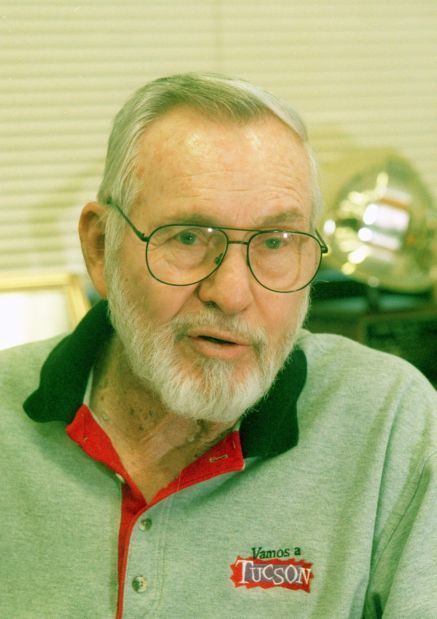Former Tucson Mayor George Miller died minutes after midnight Christmas morning at 92.
“There was no greater advocate for peace on earth and good will towards men,” his stepson, Gene Einfrank, said via email.
Miller died at 12:15 a.m. at a nursing home here, Einfrank said.
“He was sharp as a tack all the way to the end. He just had a body that was failing. He always loved to tell jokes, and he told jokes to the very end.”
Miller, a Democrat, served more than two decades at City Hall. He spent 14 years as a city councilman and eight years as mayor. He retired in 1999.
The family will have a small private gathering today and is planning a larger community event in the next couple of weeks.
“George was a really kind man who cared enormously about social conditions, both in the community around him and nationally,” said Tom Volgy, who was elected to the City Council along with Miller in 1977, and later became mayor.
Miller took over as mayor in 1991.
“He dedicated a very large part of his adult life dealing with social-justice issues. He did so on the council and he did so as an activist before the City Council,” Volgy said. “He was involved in one of the first sit-ins in the late ’50s and early ’60s in Tucson on the lunch counters when they were racially segregated. It was a kind of orientation to life that carried with him all the time.”
Although in private Miller demonstrated his sense of humor, “in the public he was always business,” Volgy said, “He took his job very seriously.”
And it was a serious time, with many challenges, Volgy said.
“It was a period of ups and downs in the economy. He and I came into the office recognizing there was an enormous amount of poverty in Tucson and that we needed to work to deal with that.”
Ward 4 Councilwoman Shirley Scott served with Miller for eight years on the City Council, she said.
“He invited homeless people up to his office to talk to him about their needs. … He really did care about the issues and the people.”
Miller pushed to create JobPath, a program that helps low-income workers learn and refine skills. And he served as a kind of mentor to everyone from Volgy to current Mayor Jonathan Rothschild.
“I’ve known George for close to my whole life. In the last few years, I would upon occasion go to him for not so much advice as perspective,” said Rothschild, who last met with Miller about six weeks ago.
“His mind was as strong as ever. And we just talked about the perspective of representing a city — the relationships with your council people, your citizens and doing the best for the community as a whole. And that was a passion that George had until his final days.
“George’s obvious legacy was one of service to the community and, again, guiding the city through a time of great change, from the late 1970s to practically 2000. His last real strong political act was helping create the Rio Nuevo district,” Rothschild continued, referring to what some view as a bungled opportunity for the city but is now showing signs of success.
“He obviously expressed some dissatisfaction in what occurred over the years of the district, but I think he was hopeful over the last few years that we were regaining the spirit of what he was hoping would be achieved, which was a downtown revitalization,” Rothschild said.
Miller’s family provided a list of his achievements, which as a councilman included passing legislation prohibiting smoking in restaurants, hiring magistrates based on merit, establishing a sign code and developing Kidco after-school programs.
He advocated for the creation of the Domestic Violence Commission and the GLBT Commission and forged an intergovernmental agreement with the Tucson Unified School District allowing for the purchase of land for a new Drachman school.
Miller was born in Detroit. He moved to Tucson in 1939, where he attended Tucson High during his senior year but graduated after summer school in Detroit, according to his family. He returned to Tucson for its climate and attended the University of Arizona until World War II, when he joined the Marine Corps.
In the Battle of Saipan, he was wounded and awarded the Purple Heart. After the war, he earned both his bachelor’s degree and master’s in education at the UA.
Miller practice-taught at Tucson High in 1947, then taught summer school classes in American history and American problems.
He taught social studies in the Amphitheater Public Schools district, then returned to Michigan. While there he refused to testify before the House Un-American Activities Committee during the McCarthy era and was forced to leave teaching. He became a painting contractor, operating a business for 31 years.
From 2000 to 2010, Miller taught history and government at Pima Community College. Later, as a volunteer, he taught citizen-preparation classes through the Pima County Adult Education program.
In addition to the Purple Heart, Miller earned many awards, including the UA Alumni Association Distinguished Citizen Award (1993), the Tucson Urban League’s Whitney Young Humanitarian Award (2000) and the ACLU Civil Libertarian Award (2000). The Miller-Golf Links Library is named after him, and he was a Father of the Year Honoree in 1995.
He is survived by his wife, Roslyn, and their eight children, 12 grandchildren and five great-grandchildren.





